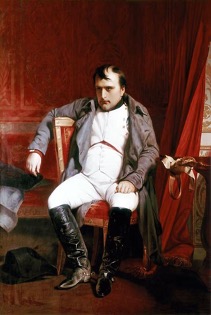French language trouble Part 2: Who’s winning? — Can you relate?
The trouble with French is that it’s so hard to learn. Even Napoleon couldn’t speak it. Not very well, anyway. Poor old Napoleon. How the mighty must fall. From adulterer to cuckold; from Emperor to divorcee. Beaten on the Nile; at Trafalgar; and again at Waterloo; then exiled to the back-blocks of Elba, and later to St Helena, where he died. And, quel scandale—where he had his willy whipped off during an autopsy.
After all he did for France—and for civil codes around the world—it comes as some surprise that his French was not up to speed. He always spoke with a strong Corsican accent and his spelling and grammar were, apparently, appalling. Welcome to the club—after a quarter of a century in France, my French is not very good either.
Why? Because it’s so bloody hard to learn that’s why.

Although the Brexit civil war is calming down (a bit), the long-standing English versus French language rivalry still flourishes. Especially, the debate about which of the two will be more widely spoken in the future.
Not that any of this speculative ranking matters much—or even at all. Because it’s probably only really interesting to language jingoes. And others who waste their time obsessing about the relative importance of English versus French. Or those intent on fanning the historic rivalries between these two neighbours separated by the narrowest of narrow strips of water. And who have either been in bed with each other—or at each others’ throats—for centuries.
But along the way, the rivalry does reveal some interesting insights into how Anglo Saxons and the French see each other.
In 1066 William the Conquerer took Norman French with him to England. But linguistic apartheid soon developed: French was spoken at William’s royal court—and by the upper and business classes. The commoners, however, continued to speak a form of English, which they’d been speaking since the arrival of the Anglo Saxons from Europe. It was considered a lowbrow medium of communication amongst the lower echelons.
When the Hundred Years war broke out between England and France, things changed dramatically. French was soon seen as the language of the enemy and English began to reassert itself. After appropriating a vast lexicon of French vocabulary (especially culinary and legal terms) it became the voice of government again, and then the language of learning at Oxford.

Before 1536 it was forbidden to read the Bible in English. But when Henry VIII made himself head of the Church, the Bible was universally read in English. And by the 17th Century, the Authorised Version had become the standard for English-speaking Protestants throughout the world. This undoubtedly entrenched and spread its influence.
In France, on the other hand, although the priesthood spoke French, the Latin Vulgate was the official Bible—and it remains in use today—as it does in the Latin Church around the world.
Empire building became a highly competitive race between England and France in the 17th and 18th Centuries. As the voyages of discovery spread out across the world, English and French followed their explorers. And they invariably became the official languages or lingua franca in many of these overseas possessions. But there is a debate about “what kind of French” this was in the French territories. Very few colonists were from the Paris area. Most came from those parts of France in which French was not the usual first language before the 20th Century. And in vast parts of France, almost nobody spoke French.
These days many French language nationalists have predicted an imminent crisis. They believe that the barbarians are at the gate and that they’ve been there for quite a while. La langue française is under threat—if not attack. They feel that there is a dark cloud in their paradise. Some even fear there’s an impending English language hurricane brewing.
Looks like the English horse is pulling ahead in the language derby. But can the French stay in the race? Read on to Part 3 of this series to find out what the future holds.
If you’re learning French can you relate to the troubles Ray is experiencing? Please share your experiences in the comments below.
The trouble with French Series:Part 1: The race is on
Part 2: Who’s winning?
Part 3: The home straight
Part 4: And the winner is… who cares?
Image credits:
1. Napoleon at Fontainebleau after his abdication. (Delarouche)
2. Napoleon crowns himself Emperor. (Detail David)
3. The Brexit civil war is calming down (a bit).
4. Statue of William the Conqueror in Falaise.
5. In France the Latin Vulgate remains in use today.
6. When Henry VIII made himself head of the Church, the Bible could be read in English










Very I retesting! I have never thought about the French English conquest quite this way!
Thanks Celia, Yes, fascinating how language and nationalism have always been intertwined in English/French history. Please keep a lookout for my next article – coming soon.
Merci.
Ray
Witty and well-written! I like the allegory of the two neighbours “who have either been in bed with each other—or at each others’ throats—for centuries.” ?
Bonjour Jocelyne, Thanks for reading my article. I hope you enjoy the next two as well.
Needless to say, many of the idioms I hear when I’m playing petanque can’t be printed here.
Tant pis.
Amicalement
Ray
Very good reading, very interesting article.
Bonjour Marie-Elaina, and thanks for your comment. Did you see my first rant on how hard it’s been? Also, please remember there are two more in the pipeline and coming soon.
Merci encore.
Ray